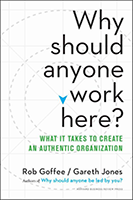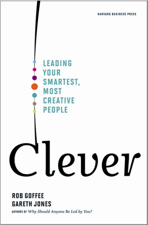What we say...
-
3 Critical Skills to Teach in Leadership Training
Sunday 1st September 2019
-
Leadership, Change and Uncertainty
Friday 6th April 2018
-
What does the Oxfam scandal tell us about organisations
Friday 23rd February 2018
-
I look forward to speaking at The HR Congress
Tuesday 31st October 2017
-
Why should anyone work here - Animation
Friday 11th December 2015
Leading Clever People - Transcript
SARAH GREEN: Welcome to the Harvard Business IdeaCast. I'm Sarah Green from harvardbusiness.org, and I'm on the phone today with Gareth Jones, co-author of Clever: Leading Your Smartest, Most Creative People with Rob Goffee. Gareth is a fellow for the Center for Management Development at London Business School
Gareth, thanks so much for joining us today.
GARETH JONES: My pleasure.
SARAH GREEN: First, tell us what you mean when you say "clever people."
GARETH JONES: Well, I think the simplest definition is to say that we're interested in people who add disproportionate amounts of value to their organizations. So by "clever," we don't necessarily mean people with the highest IQ or the ones with Harvard PhDs. We mean people who have this capacity to create huge amounts of value.
And we deliberately kept the word "clever" for an American audience, because we realized that in America, the word "clever" has a double meaning. And we wanted to capture that double meaning. It's captured in the English idiom "too clever by half."
And some of these people in our book are a bit like that. But they are, of course, still the people who can create a piece of coding for Microsoft that gives them a competitive advantage, or help to develop a new drug against cancer, or develop a new game for Electronic Arts, or make a McLaren car go even faster. So they are interesting from that point of view.
SARAH GREEN: So you're saying that they are hugely valuable, but it sounds like there maybe is a downside there?
GARETH JONES: Well, they can be extremely difficult. I think we say in the book, one of the very common characteristics they have is they say they don't want to be leaders. And they most certainly say they don't want to be led. And yet, we know that they're more productive when they're well led. And that's why we've tried to document the things that leaders can do to make them even more effective. You don't get the best out of clever people just by indulging them. They need discipline. They need clear boundaries.
SARAH GREEN: So that's interesting. Because it sounds like what you're getting at here is that clever people aren't just your most successful employees, but they're specifically a certain kind of successful.
GARETH JONES: That's right. They're capable of innovation. They're capable of breakthrough ideas which can give you real competitive advantage. But one thing we would say about them is they're not easy. These are not easy or compliant employees. They are difficult, but they're well worth the effort.
SARAH GREEN: So if you are a leader and you're supposed to be leading some people like this, what are some things you should do and maybe some things you should not do to get more out of them?
GARETH JONES: Well, actually, in the book, we produce a table of dos and don'ts for leading clever people. And one of the things we say, for example, is do explain and persuade them. Don't tell them what to do. Do use your expertise. Don't use your hierarchy. So the kinds of people in our book are not impressed if I say, hi, I'm Gareth Jones, I'm a senior vice president.
In fact, it took me back a bit to my time in the music industry, when I worked with PolyGram. And I visited Def Jam Records in New York. And I introduced myself by saying, my name is Dr. Gareth Jones, I'm senior vice president from PolyGram International. And their reply was, so what? So you have to prove that you have value to them.
Here's a really pithy piece of advice: Tell them what to do, but don't tell them how to do it. So tell them that you want a solution to a really complex problem, and they'll rise to the challenge. If you begin to tell them how to do it, they'll get extremely irritated.
SARAH GREEN: And is there maybe an example of someone that you talked to in the course of your research who has done this well?
GARETH JONES: Yes. You have to give them a real problem. Can you cure the problem of the wobbling bridge? Which is a real example of Millennium Bridge in London, which wobbled when people walked over it. And it was a bit of an engineering conundrum. And Ove Arup said, that's the kind of problem we're really interested in. And they did it in such an innovative way that they actually patented the solution.
I have to say, the field work for this book was absolutely fascinating. We interviewed an extremely interesting American guy who had spent his whole career running basically high-tech businesses. And he tells a lovely story of accepting the challenge of creating a computer system that many thousands of people could log onto simultaneously.
And their first response to this problem was, this can't be done. So he went away for the weekend, and he came back with some ideas which he presented to the team. Not very good ideas, as it happened. And they immediately said, we can do better than that. So they really rise to the challenge of big problems.
SARAH GREEN: So there's a certain ambitiousness there to do the impossible that marks a clever person?
GARETH JONES: Absolutely. This is, of course, one of the challenges. They're not interested in the routine and mundane. Of course, successful organizations have to do the routine and mundane, as well. So you are looking for balance across the whole organization. In fact, the last third of the book is really about how you locate clever individuals inside clever organizations.
SARAH GREEN: It does seem like that would be useful. Because I think we're all familiar from our own work lives of either feeling like our own potential was being wasted or that we know someone is spinning their wheels in a job that is maybe not suited to their talents.
GARETH JONES: Sure. In some respects, just think of Harvard Business School itself as a good example. For our last book, actually, we interviewed the dean. And he said that running Harvard Business School was like herding cats, but that he had 70 world-class professors to choose from.
SARAH GREEN: It's interesting that you mention herding cats, actually, because that was a phrase I kept thinking of as I was going through the book. Because we've talked a little bit about the organization and a lot about individuals, but I do get the feeling that leading a team of clever people might be like herding cats.
GARETH JONES: It is. And, in fact, the second section of the book is about clever teams. And it begins with the story of Lewis Hamilton winning the Formula One championship last season. And, of course, he wins the championship on the last race on the last lap in the last 500 meters. So it looks like a story about this heroic driver, Lewis Hamilton.
Of course, behind Lewis Hamilton is an incredibly clever team. And we start to explore the peculiar and rather eccentric dynamics of clever teams. Because in the end, even with a very clever scientist, they don't develop a new pharmaceutical product on their own. It's always about clever teams full of toxicologists and clinical pharmacologists and patent lawyers and so on. And putting together these rather high-octane teams is how you deliver tremendous value for your organization.
And indeed not just your organization, by the way, but for the wider society. The scale of the challenges facing humankind means that we need cleverness more than ever before.
SARAH GREEN: It seems like when you're talking about the role of the leader and these different ways, trying to lead people who don't want to be led, that what you're calling for is really humility. And I wonder, it seems like for a lot of people who do want to lead, humility may be a hard skill for them to develop. Is that something that you encountered?
GARETH JONES: Absolutely. In fact, one of the guys that we interviewed for the book said, you know when you're doing a really good job leading clever people when they say about you, you don't get in the way too much. So, actually, that's the highest compliment they're ever likely to pay to you is, you don't get in the way too much.
We also say in the book, if you're looking for their thanks, forget it. The real payback, of course, comes from the moment that Electronic Arts launches Spore, the new game that wins all the prizes. The moment Genentech produces Avastin and revolutionizes the treatment for certain forms of cancer. That's the real payback. That's the real payback.
SARAH GREEN: And do you have any thoughts for people listening who might suspect that they are, in fact, one of the clever people?
GARETH JONES: Well, I think they might already know it for themselves. Because they probably have a rather tense relationship with their organization. So we specifically say that we're defining "clever" here as people who need organizations. You see, there are some clever people who don't need organizations, solo musicians. But if you're a concert violinist, you need an orchestra. And so these people recognize that they need organizations, but they have a rather tense and fraught relationship with their organization.
SARAH GREEN: I'm curious to know what in the course of your research on this surprised you, if anything. When you were interviewing these people and uncovering this, was there anything that struck you that you thought, wow, I never expected?
GARETH JONES: Yes. I think one of the great joys of doing the research the way we do it-- because Rob and I, as he often says, we're both old sociologists, so we do the field work ourselves. And we got into some fantastically interesting organizations. But we started off, you see, by thinking that we would find cleverness in Microsoft and Google and Apple and Novartis and Roche and so on. But, actually, you find cleverness in schools and hospitals and in government administration. You find cleverness all over the place where people have this capacity to add disproportionate amounts of value.
One of our favorite stories, actually, is about Albert Camus winning the Nobel Prize for Literature. And when he wins the Nobel Prize, he dedicates the prize to his teacher. And the idea that somewhere in Camus' past is a teacher who inspires him to produce some of the greatest literature of the 20th century means that we shouldn't just think about investment banks and McKenzie's and consulting companies. People can be clever in all kinds of contexts.
SARAH GREEN: Gareth Jones, thanks so much for joining us today.
GARETH JONES: It's been my pleasure.
SARAH GREEN: That was Gareth Jones, co-author with Rob Goffee of Clever: Leading Your Smartest, Most Creative People. And, as always, you can send your feedback to ideacast@harvardbusiness.org. Thanks.
Credit: Harvard Business Review



